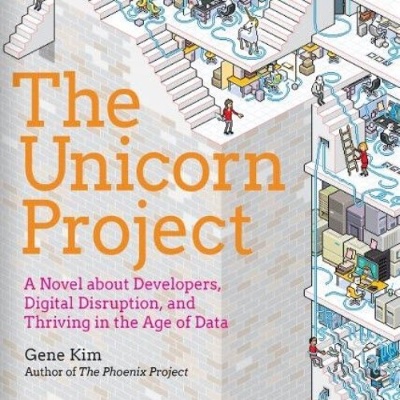The Unicorn Project, Gene Kim
Apr 10, 2020 · 3 minute read · CommentsPost Tag: bookmanagement

Двойственное впечатление. Формально все хорошо - бизнес роман об инженере что перешла на “провальный” проект, но не растерялась и привнесла новые технологии, подходы и вместе с командой единомышленников они вместе пришли к успеху. Но есть стойкое чувство как отрабатывается текущая повестка. Гендерное равенство - есть, польза open source - тоже есть, функциональное программирование - присутствует, вовлечённость инженеров в бизнес, work-life баланс и т.д. - добавлено. Все собрали, смешали, запекли, а первая книга, The Phoenix Project, помнится повеселее была. В итоге вышло похоже конечно, но прежней радости от прочтения нет.
Заметки:
-
“There are Five Ideals,” Erik begins. The whole table turns their attention to him. “I’ve already told you about the First Ideal of Locality and Simplicity. We need to design things so that we have locality in our systems and the organizations that build them. And we need simplicity in everything we do. The last place we want complexity is internally, whether it’s in our code, in our organization, or in our processes. The external world is complex enough, so it would be intolerable if we allow it in things we can actually control! We must make it easy to do our work.”
-
“The Second Ideal is Focus, Flow, and Joy. It’s all about how our daily work feels. Is our work marked by boredom and waiting for other people to get things done on our behalf? Do we blindly work on small pieces of the whole, only seeing the outcomes of our work during a deployment when everything blows up, leading to firefighting, punishment, and burnout? Or do we work in small batches, ideally single-piece flow, getting fast and continual feedback on our work? These are the conditions that allow for focus and flow, challenge, learning, discovery, mastering our domain, and even joy.”
-
“In its briefest form: The Third Ideal is Improvement of Daily Work. Reflect upon what the Toyota Andon cord teaches us about how we must elevate improvement of daily work over daily work itself. The Fourth Ideal is Psychological Safety, where we make it safe to talk about problems, because solving problems requires prevention, which requires honesty, and honesty requires the absence of fear. In manufacturing, psychological safety is just as important as physical safety. And finally, the Fifth Ideal is Customer Focus, where we ruthlessly question whether something actually matters to our customers, as in, are they willing to pay us for it or is it only of value to our functional silo?”
-
Ideals
- The First Ideal — Locality and Simplicity
- The Second Ideal — Focus, Flow, and Joy
- The Third Ideal — Improvement of Daily Work
- The Fourth Ideal — Psychological Safety
- The Fifth Ideal — Customer
-
She’s always been a prolific notetaker. She remembers reading somewhere, “In order to speak clearly, you need to be able to think clearly. And to think clearly, you usually need to be able to write it clearly.”
-
“We are at the dawn of the Age of Software and Data. Steve and Maggie are even thinking about what data is most important to the long-term success of the company, exploring ways of buying data from our customers and even potentially acquiring strategic data sources. And Steve already knows that technologists are some of the most important people in the company. Which is why you’re a distinguished engineer”